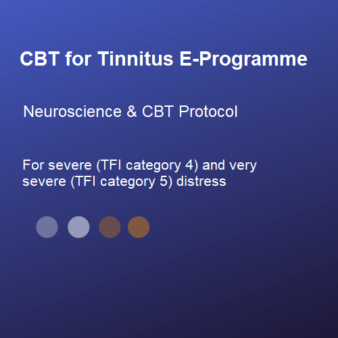Why isn't the CBT for Tinnitus E-Programme an App?
Published by Debbie Featherstone in It's more than tinnitus · Tuesday 02 Aug 2022
Two years ago in 2020, I looked in to making an app for the CBT for Tinnitus E-Programme. A start-up organisation had peeked my interest earlier that year, so I decided to look in to it. So why did I stop?
Answer: Because apps are habit-forming and the whole point of using the Cognitive Behavioural Therapy for Tinnitus E-Programme is to move habit-formed thinking away from tinnitus so you think of it less and less, don’t care whether it’s there or not, and ultimately ‘forget to remember’ to think about it. I realised that an app would sabotage everything the CBT for Tinnitus E-Programme does. For me to encourage people to use an app for their tinnitus would be like encouraging someone being bullied on their social media to keep looking to see what else some troll has said about them, rather than making the suggestion they delete the social media app!
The CBT for Tinnitus E-Programme walks you through a process, stage by stage. It has a beginning, a middle and an end. Those three stages are fundamental to therapy leading to successful outcomes for people using health services in psychology, including counselling and psychotherapy. In the E-Programme, the beginning comprises stages 1-4, the middle comprises stages 5-8, and the end comprises stages 9-12. Having an "end" to the process is very significant and important; knowing from the beginning there is an end goes a long way towards motivating us to get there!
Apps on the other hand, encourage us to keep using them – even subscribing longer-term to do so. And because we are so used to having apps on our phones for anything and everything these days, we are conditioned in to using them and often even to thinking we need them. We form an attachment – an association – with them. Each and every time we go to use an app on our phone, do we even really think about what we are doing? Or is it habit-driven? Unfortunately, we are conditioning ourselves in to using them, strengthening the habit as we persist with the same behaviour over and over. Each and every time we repeat that behaviour, the more hard-wired the habit becomes in the neural pathways of our brain. So how could using an app for the CBT for Tinnitus E-Programme help to forget-to-remember to think about tinnitus? It would have the reverse effect in my view. Hence my decision two years ago not to go down the route of an app.
Some other clinicians support the use of apps for tinnitus. My view is when the purpose of them is clear, they may be helpful for a limited time. For example, understanding about tinnitus, what it is etc. They can be useful for a few weeks to help you identify the common negative thoughts you have been having too when they are Cognitive Therapy based. They are unlikely to help behaviourally though due to encouraging your attention-focus on tinnitus. There is also a plethora of apps for “sound therapy for tinnitus”. I always wonder why we are encouraged to listen to something because it is for tinnitus, when there is so much already available – for free – that provides relaxing music and sounds to hear. Just knowing what you are listening to is “for tinnitus” maintains an unhelpful reminder of tinnitus.
If you are interested in some published research around apps for tinnitus, it is out there. Two examples of comprehensive research are https://www.ncbi.nlm.nih.gov/pmc/articles/PMC6364200/ (2019) and https://pubmed.ncbi.nlm.nih.gov/32808939/ (2020)
Neither of these were able to conclude that apps for tinnitus have efficacy; however, research is on-going.
Debbie Featherstone MSc
Hearing Therapist & Psychotherapist
CBT for Tinnitus E-Programme
0
reviews



